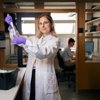-

A cluster contribution to European life science innovation and competitiveness?
-

How the Nobel discovery is used in drug development
Regulatory T cells keep the immune system in check, a discovery now awarded the 2025 Nobel Prize in Physiology or Medicine. Qiang Pan Hammarström explains how this finding is being applied in today’s drug development, and what challenges remain.
-

Genmab to Acquire Dutch biotech for USD 8 Billion
Danish pharmaceutical company Genmab has agreed to acquire Dutch firm Merus, a developer of cancer therapies, for USD 8 billion, equivalent to nearly SEK 75 billion.
-

Astra Zeneca pauses multi-million investment in the UK
Astra Zeneca has paused a planned investment worth $270 million. It is the latest pharmaceutical company to pull back on its commitments in the UK.
-

Topp tio dyraste läkemedlen på svenska apotek
En spruta för över en miljon kronor är det dyraste läkemedlet som går att få tag på inom läkemedelsförmånen på svenska apotek. Life Science Sweden har sammanställt listan över de subventionerade läkemedel inom öppenvården med allra högst prislapp per förpackning.
-

”Läkemedelstillverkare måste tänka om kring cybersäkerhet”
Läkemedelsföretagen har blivit en allt vanligare måltavla för cyberattacker, inte minst från statsstödda grupper. Därför behöver branschen fokusera om för att minska sin sårbarhet, skriver Hexagons Jeppe Bank i en debattartikel.
-

Virology professor on the threat from X: ”The next pandemic could be worse“
The question is not if, but when we will be affected by a new unknown virus that causes yet another pandemic. Are we sufficiently prepared? "Absolutely not!", responds virologist Niklas Arnberg.
-

Astra Zeneca gör ny mångmiljardsatsning i Kina – bygger forskningscentrum i Peking
Astra Zeneca har beslutat att satsa 2,5 miljarder dollar, motsvarande drygt 25 miljarder kronor, på ett nytt globalt forskningscentrum i Kinas huvudstad Peking.
-

Cancer researcher: “We can do better and reduce suffering”
Lund University researcher Catharina Hagerling is developing innovative methods to understand metastatic cancer, aiming to create more targeted treatments for patients with disseminated cancer.
-

A tiny animal with great importance
From the mythical Ganges River to the less sacred, but considerably cleaner waters in KI's aquariums in Solna. The little zebrafish has made an unconscious career – as an increasingly important model organism in medical research.
-

Ukraine war fuels rise of totally resistent bacteria
War-torn Ukraine is not just suffering from hostile attacks from a foreign aggressor, but also from the threat of a totally resistant and contagious bacteria.
-

Kriget i Ukraina ger bränsle åt totalt resistenta bakterier
Krigshärjade Ukraina lider inte bara av fientliga attacker från en utländsk angripare, utan också från hotet från en totalt resistent och smittsam bakterie.
-

New cell therapy raises hope for curing type 1 diabetes – "Never succeeded before"
For the first time, a patient with type 1 diabetes has undergone an islet transplantation using genetically modified insulin-producing cells that do not require immunosuppressive drugs. "A major immunological breakthrough," says Professor Per-Ola Carlsson, who leads the clinical study, to Life Science Sweden.
-

MSD discontinues development of cancer drugs after trial failures
MSD suspends Phase 3 trials for two drug programs for different forms of cancer after trial failures.
-

Alligator säljer antikroppar och fokuserar på huvudprojekt
Alligator Bioscience överlåter två bispecifika antikroppar till samarbetspartnern Orion Corporation.
-

Förstärkta CAR-T-celler mot cancer testas kliniskt i Uppsala
I Uppsala testas just nu en läkemedelskandidat, en förstärkt CAR-T-cellterapi, för patienter med svårbehandlad lymfom. Kliniska prövningar är påbörjade och den första patienten har redan fått behandlingen.
-

From lab to patient – the art of developing new antibody therapies
For 25 years, Danish company Genmab has been developing antibodies and has managed to get several drugs all the way to the patient. Esther Breij has been along for much of the journey and has experienced setbacks, but also huge discoveries. “It’s amazing when you succeed,” she says.
-

Carl Borrebaeck – professor and serial entrepreneur with a taste for speed
Award-winning cancer researcher, the founder of many listed companies, and constantly in the academic and commercial spotlight for decades. However, Carl Borrebaeck, Professor of Immunotechnology at Lund, is not yet satisfied. “We have a new, potentially super exciting project in the pipeline,” he says.
-

Ancient DNA provides new insights – “The immune system lost its job”
Ancient bone remains from our ancestors have provided new insights into the prevalence of multiple sclerosis. By looking back in time, researchers can provide a possible explanation for why the disease is more prevalent in northern Europe.
-

Beta-blockers are often given unnecessarily, a study finds – “This will affect future practice”
Patients who have suffered a minor heart attack do not benefit from beta-blockers, according to a major new study that may change guidelines for cardiac care.
-

Venom from the deathstalker carries radiopharmaceuticals to the brain
In order to target cancerous brain tumours with radionuclides, the problematic blood-brain barrier must first be crossed. Life Science Sweden has visited a KI researcher who is trialling an unusual approach ‒ using scorpion venom.
-

TLV:s system igång efter hackerattack – men data har förlorats
TLV börjar får ordning på sina it-system igen efter den allvarliga hackerattacken i slutet av januari. Men alla data går inte att återställa.
-

Samuel Lagercrantz: ”Drömmen blev en mardröm för life science-entreprenören”
En hyllad forskare och entreprenör i Västsverige tvingades lämna bolaget han själv grundat. Fallet har väckt stort intresse bland Life Science Swedens läsare. Samuel Lagercrantz, chefredaktör för Life Science Sweden, kommenterar fallet.
-

Decades of research destroyed at KI – a hacker attack cannot be ruled out!
Years of research, together with half a billion Swedish krona, went up in smoke when the freezers at Karolinska Institutet overheated. The breakdown has now been reported to the police.
Få tillgång till allt innehåll på Life Science Sweden
Ingen bindningstid eller kortinformation krävs
Redan prenumerant? Logga in
Gäller endast personlig prenumeration.
Kontakta oss för en företagslösning.